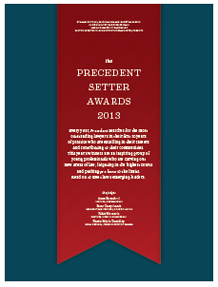 “There was a lot of talk about boobs,” the young woman tells me matter-of-factly, explaining her decision to leave law after her articling year.
“There was a lot of talk about boobs,” the young woman tells me matter-of-factly, explaining her decision to leave law after her articling year.
“You mean it came up in a case about breast implants?” I ask hopefully. Sadly, no. It came up at lunch. “One of the partners would take me to lunch and talk about the waitress’s boobs,” she said. She also said some lawyers would brush up against her when they passed in the hall. I was shocked.
This story was on my mind when an email came in from the Law Society of Upper Canada sharing the results of a 10-year study of discrimination and harassment in the profession. The good news: the number of discrimination complaints is not going up. The bad news: the number of discrimination complaints is not going down. The study looked at complaints made on various grounds, including age, race, sexual orientation and disability. But sex discrimination (almost entirely against women) made up 50 percent of all complaints. Half of those complaints were on grounds of harassment.
On the bright side, there have been numerous initiatives by the Law Society, legal associations and law firms to advance women in the profession. To date, however, the success of most of these programs has been anecdotal. It’s time to quantify their success. When a firm commits to hiring and advancing women, let’s count how many women it has at the firm and share it publicly every year. If there are positive retention and promotion trends, they should be celebrated. If it turns out the numbers don’t support the anecdotes, that’s something that must be addressed.
From where I sit, anecdotal evidence (which is all I’ve got) tells me that law is a better place for women than it was 10 years ago. And I’d attribute that in part to the rise of in-house counsel. As you’ll read in this special in-house issue, the number of lawyers working in corporations has jumped by more than 50 percent over the past decade.
Legions of talented lawyers have left private practice to join the ranks of corporate counsel. What they lose in paycheque they make up not only in a more predictable and flexible schedule, but also in the chance to be an integral part of a business. “You really feel as though you can see the impact of your advice on a day-to-day basis,” explains TIFF lawyer Sarah Huggins, who graces the front cover of this issue.
Stories like Huggins’s are the ones I like to hear. It’s my hope they will inspire other young women. Rather than leaving law when they need a change, I hope instead they will seek out a role that will convince them to stay.
Tell us about an awesome lawyer
2014 will mark the fifth anniversary of the Precedent Setter Awards. Help us mark the occasion by nominating an outstanding lawyer who was called to the bar in the last 10 years. All it takes is a short letter to put your nominee’s name forward and we’ll do the rest. Winners will be featured in our summer issue.
Visit lawandstyle.ca/awards for more information. Nominations close January 30.
Photo: flickr via francois



